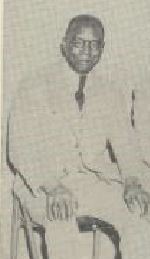Gerald Butler Harris (1893-1976)
Educator, Businessman, Politician
Gerald Butler Harris was born in Gloucester County, Virginia, on April 4, 1893. He attended Gloucester Agricultural and Industrial School (known as Gloucester Academy) at Capahosic and graduated from Lincoln University in Oxford, Pennsylvania in 1923. Harris did further study at Columbia University in New York City. He taught math and science for four years at Tarboro High School in North Carolina. He was an elementary school principal in Middlesex County, Virginia for seven years and a high school teacher at Middlesex Training School for six years. Later, he taught at the Rappahannock Industrial Academy in Essex County, Virginia and was principal of Beverly Allen High School in West Point, Virginia. After his retirement, Butler Harris, as he was commonly known, worked in Middlesex County Public Schools as a substitute teacher.
Harris was an innovator not only in the field of education but in business and politics as well.
He published a newspaper, The Middlesex Review; operated a movie theatre; owned and operated a baseball park; was a farmer; and was an agent for Richmond Beneficial Life Insurance Company. A founding member of the Middlesex NAACP, he ran for the Saluda seat on the
Middlesex County Board of Supervisors in 1943. He lived most of his adult life in Middlesex County, Virginia, dying in a Richmond, Virginia nursing home on May 18, 1976.
Gerald Butler Harris was married to Lucy Cook Harris (1893-1975), also an educator and activist, who was a granddaughter of Ralph and Betsy Cook who owned much of Cooks Corner. The present-day office of Atlantic Broadband is on the site of the Harris home; the Urbanna Flea Market is on the site of the Harris baseball diamond and movie theatre. Gerald Butler Harris’ many ventures, conducted largely during the Jim Crow era, provided services to the African- American community at a time when the majority community often did not cater to African Americans.



